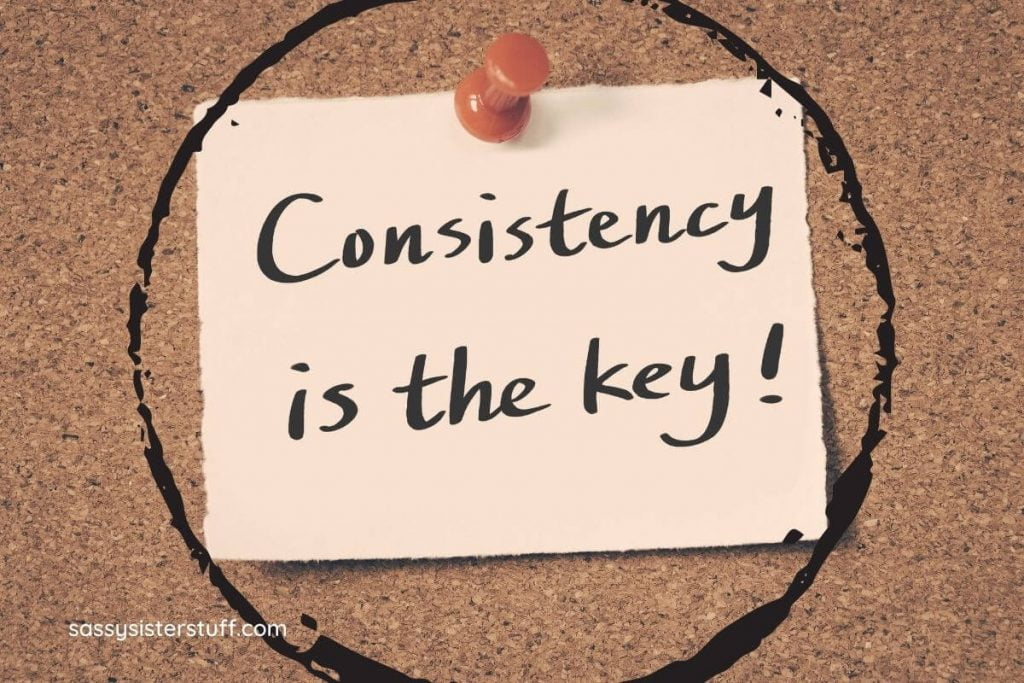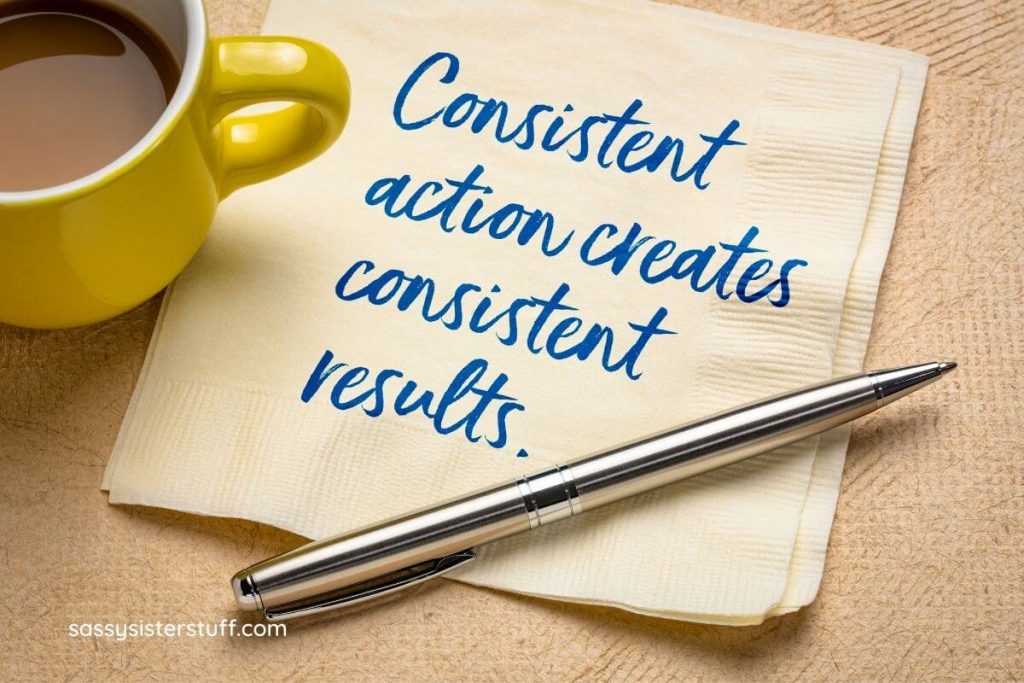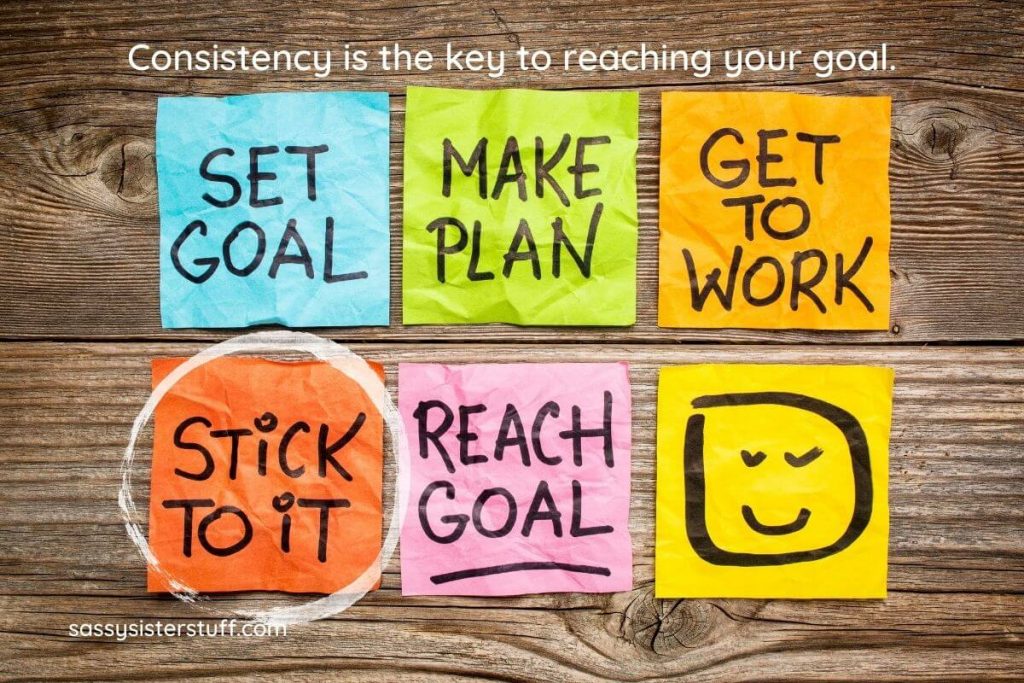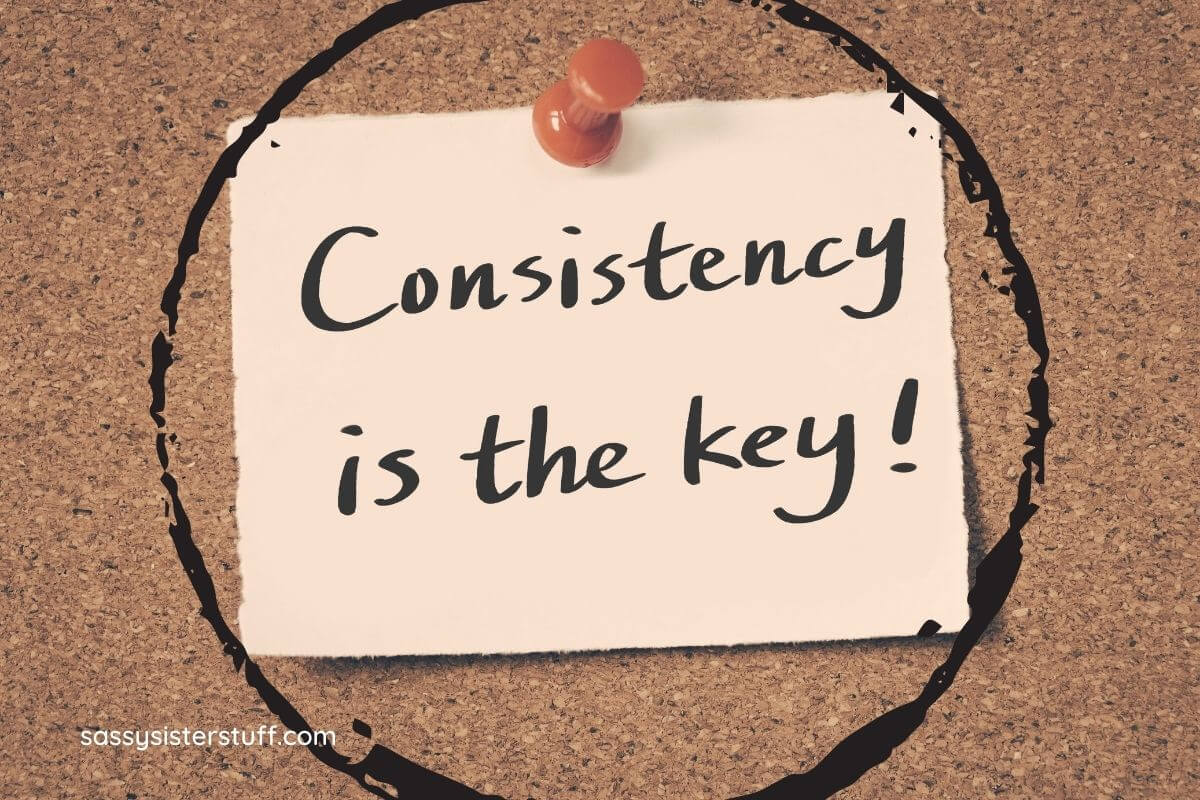Consistency is the Key to Success in All Things
It does not matter what you are trying to achieve. Consistency is the key to success in ALL THINGS. Whether you have set personal or professional goals, consistency is essential.
Consider some of these long-term goals and the many mini-tasks that come along with them.
- Personal Growth and Development
- Starting a New Business
- Adopting a Child
- Getting a College Degree
- Moving Up the Ladder at Work
- Losing Weight
- Developing a Lifestyle of Happiness
Your end goal does not matter. You must be consistent in your efforts if you are working toward a long-term goal of improving yourself or accomplishing something BIG.
Think about your long-term goals in life and how you are going to accomplish them. For the purpose of this article, I am going to use the term “goal” even though we all have many goals in life. It’s just simpler for you to think in terms of ONE goal while you’re reading this article.

What Does Consistency Mean?
The Cambridge Dictionary defines consistency as the quality of always behaving or performing in a similar way, or of always happening in a similar way; the state or condition of always happening or behaving in the same way.
Stefan James, the founder of Project Life Mastery and a Life and Business Coach, says “consistency is referred to as adherence to the same principles in a steadfast way. If you want to achieve anything of value and meaning in your life, then you need to be consistent.”
In my terms, consistency refers to always applying your principles, values, and finest behaviors to the important tasks that are necessary to reach your long-term goals.
In other words, ALWAYS DO WHAT NEEDS TO BE DONE regardless of challenges and obstacles that interfere with your personal and professional goals.
It takes a mindset of positivity to accomplish consistency and dedication to completing an activity or task that helps you accomplish a goal.
Being consistent means you are clear on what you want to accomplish and are committed to taking all the steps necessary to reach it.
Your consistency reflects your values and standards. It is indicative of your efforts to improve yourself in personal and professional ways.
Why is it Important to be Consistent?
Consistency is important because it helps you develop discipline and self-control that aligns with personal and professional growth. It helps you build a higher level of trust and accountability toward meeting your goals.
Research proves that the key to success is consistency. So let’s move forward with the intention of developing consistent habits and a positive mindset toward reaching your goals.

How To Develop Consistency
We live in a fast-paced world where virtually anything we desire is a click away. Instant gratification is commonplace and it’s normal to expect big results from very little effort.
With a simple click, you can get goods and services delivered to your doorstep – sometimes in a matter of hours.
Immediate gratification can make us lazy. When we don’t see results quickly, we are at risk of:
- Quitting too soon
- Missing an opportunity
- Failing to invest in ourselves
Let’s consider what can happen to hamper your consistency and avoid the instant gratification slack now that we know consistency is the key to success in all things.
Some Tasks Feel Too Big to Handle
All goals have certain tasks that should be completed as part of accomplishing the goal. If you want to finish your degree, you have classes to take, projects to do, teachers to meet with, and so forth.
It can seem overwhelming to tackle all the tasks that come with making progress toward your goal, but your tasks can be broken down into smaller tasks that are more manageable.
Taking small steps and breaking things into smaller tasks feels less overwhelming. Think about one thing at a time. The task right in front of you. The next task.
Breaking tasks down into smaller steps will help minimize the effort it takes and give you time to strategize and make things easier on your mind.
It also makes you smarter and more efficient with your time and efforts.
Some Tasks Feel Boring and Worthless
A lot of our tasks simply feel insignificant in the greater scheme of things, but you have to remember that they build upon one another. This culminates in big results – sort of like compound interest.
Doing the next necessary thing – no matter how big or small – adds up and the effort translates to your success. Consistency is the key, right?
It’s important to realize that no task is unimportant, and all tasks work together toward achieving your goal.
Small steps done consistently add up to big results. It might feel like things are moving slowly and you aren’t making progress as quickly as you’d like but your investment in SMALL STEPS will pay off if you keep at it.
Over time, you will be rewarded for whatever you are trying to achieve with your consistency and effort.

How to Develop Small Habits That Lead to Big Rewards
It takes 21 days to create a habit – even a small one. A habit is something you do without needing to talk yourself into it.
A habit is a pattern of behavior that has become normalized to the point that it takes very little effort to complete.
While some habits can interfere with your goals and success (that’s a whole different subject matter), you can intentionally develop small habits to help you meet your goals. Habits are done consistently, thus they support your consistency is the key mindset, right?
Let’s take a look at ways you can create small habits that will help make your bigger tasks more manageable. That way you will feel less overwhelmed toward accomplishing your goals.
Some Simple Steps to Develop Small Habits
Developing good habits that help move you toward your goal will make life easier and less frustrating in the long run. Let’s look at how you can develop new habits, and change your mindset in the process. Twenty-one days is all it takes, remember?
Step #1: Map out what tasks you need to do.
Start by spending some time mapping out what tasks you need to do on a regular basis. These might be basic tasks that need to be done everyday, or they could be bigger tasks that require more effort.
Identifying what tasks need to be completed helps you organize your time and know where your effort needs to be spent on your path to achieve your goal.
“We are what we repeatedly do. Excellence, then, is not an act, but a habit.”
Will Durant
Step #2: Create a plan for executing the habits.
Knowing what tasks need to be done and creating how they will be done are two different things. After you identify what tasks you need to do, it’s time to determine what you need to do to get them done.
This can include doing them yourself, delegating or hiring someone to complete them, automating them, giving up a hobby, adjusting your sleep schedule, or many other strategies. Determine the plan for executing the tasks so you can start taking action to meet your long-term goal.
Think about how time management plays into the need to create a plan for executing your new habits. Since consistency is the key, you may need to adjust some things in your life.
“A goal without a plan is just a wish.”
Antione de Saint-Exupery
Step #3: Take action.
Once you identify and make a plan to create a new habit, it’s time to walk things out. Take the actions you’ve identified and experience them first-hand.
You may decide to check email each morning at 10:00 am. By taking the action, you can experience what the habit feels like and evaluate over time if it is a habit worth keeping or modifying, and whether it is helping you feel successful in reaching your goal.
“An idea not coupled with action will never get any bigger than the brain cell it occupied.”
Arnold Glascow
Step #4: Evaluate and make changes.
Not all new habits work. It’s important to evaluate your tasks and the habits that you create to determine if they make sense.
Some new habits need to be modified and some need to be discarded. The more you practice your new habits, the easier it is to see if they are best practice for what you are trying to accomplish.
You may discover that a tweak here and there is all you need to optimize your habits for your success.
And once you understand that habits can change, you have the freedom and the responsibility to remake them.
Charles Duhigg
Breaking tasks down and creating new habits that support your success is a great way to streamline your efforts and create the success you deserve.
Break Down Big Jobs into Small Tasks for Consistency
One of the reasons people procrastinate is overwhelm. Feeling like a big task is too overwhelming to tackle can make even the committed person procrastinate or avoid something.
Breaking down big tasks into small tasks can reduce the overwhelm and make taking action easier.
Some people are invigorated by a challenge and others are petrified. The secret that makes it possible to conquer any task is looking three feet in front of you, not out onto the horizon.
Imagine running a race through the mountains. If you look out ahead of you and see the hills looming in the distance, it can feel overwhelming and actually rob you of the stamina you need to run the race.
By looking three feet ahead, you can focus on the next few steps over and over again until you crest the hills and conquer the mountains.
Here are some excellent tips for breaking down big tasks into small tasks:
- Take one day at a time.
- Stay focused on the end goal.
- Reverse engineer the outcome
Pro-Tip: What’s on the Agenda Today?
Big projects or goals take weeks, months, and sometimes years to complete but you can only work one day at a time. Ask yourself, “What’s on today’s agenda?”
Keep your focus on what you can and need to do on any given day. Looking too far ahead can weigh you down with the enormity of everything that must be done.
Map out what you can do realistically for the day in front of you and focus on reasonably completing one day’s work at a time.
Pin to Pinterest for Later
Pro-Tip: What’s the Main Thing Happening at the Moment?
Many big projects or goals have a wide variety of aspects that all matter in the grand scheme of things. But tend to the next big task that needs to be accomplished before moving forward.
You may have to do something very specific at some point along the way, but don’t worry about that until the time is at hand.
In the meantime, focus on whatever is right in front of you before moving onto the next big thing.
Pro-Tip: Start at the End and Work Backwards.
It’s great to have goals – both personal and professional. They are necessary and worthy. For this tip, you will need to definitely keep the end goal in mind.
Tackle the project by working backwards.
If the goal is a product, THINK backwards in a step-by-step manner to list the actions that must happen to get to the goal.
Then tackle them in reverse order – one at a time. This creates small tasks that ultimately end up accumulating to complete the ultimate goal.
Using these three strategies are simple ways to reduce overwhelm and stop procrastination.
Keep the Ultimate Goal in Mind
At any given time, you may have a lot of very important ideas or tasks related to your ultimate goal floating around in your brain.
These ideas all have merit and can shape your success, but they can also distract you from the most important and immediate tasks at hand.
Being off task can cost you valuable time and energy that you need to complete your goal. It’s important to keep your ultimate goal in mind.
Tips for Staying on Task
Staying on task and being disciplined is how you get big results. Doing the next task at hand, whether large or small, is what matters most for accomplishing a goal. In other words, remember that consistency is the key to achieving your goal and staying on task is necessary.
Here are some tips that will help you stay on task when there are so many issues and tasks running through your head that need to be done to meet your goal.

Use Mind Mapping
Mind mapping is a tool that you can use when you’ve got a lot of great ideas that you need to get out of your head. It helps you clear your mind so you can focus on the immediate task at hand and your end goal.
Too many ideas are distracting from the most important thing at the moment.
I think of mind mapping as a graphic organizer called a WEB. You can organize your thoughts by putting the BIG PICTURE in a circle in the center of a web. You then put ALL the other “things” that pertain to the big picture on stems that branch out from the center.
Mind mapping is similar. Write your goal in the center. Then put all the associated thoughts and tasks on branches out from the center. You can color-code or categorize the mind map, too.
Mind mapping is an excellent way to gather thoughts and associated tasks, clear your mind, and get them down for later review.

Engage in Strategic Planning
Strategic planning is an activity that plans out long-term ideas with actionable steps. Strategic planning begins with brainstorming, which can come from mind mapping ideas.
From there, tasks are broken down into annual, quarterly, and monthly goals with action plans for what needs to be done. A strategic plan will help you stay organized both in your mind and in your daily routine.

Use a Daily Planner
Daily planners are an effective way to create a to-do list that keeps you on task. Making a plan for the day the night before is an excellent way to hit the ground running and create a framework for focused energy.
Using a daily planner can help you break down the day and tasks into smaller, easier to handle activities.
Being focused on a goal or project can be hard if you don’t keep the end goal in mind and let everything else clutter up your mind.
These tips will help you manage the wide variety of tasks that need to be done to accomplish your goal.
Another Look at Why Consistency is the Key
Stick with me for a bit while I talk about runners. By the end you will see a connection between runners and why it is important to be consistent.
There are all sorts of runners out there. Trail runners, sprinters, and marathoners. Each type of runner has unique qualities that make them best suited for their type of race.
A trail runner is great at agility and dodging snares while a sprinter is excellent at using explosive speed for short periods of time.
Marathon runners have the ability to withstand long periods of running while conserving their energy.
Working on a long-term project or goal is a lot like running a marathon. While it is important to avoid snares and explosive energy, it’s more important to have the stamina to withstand the long and arduous race.
The ability to go the long haul is what helps you reach your goal and meet with success, while others simply run out of steam.
When a marathon begins, the wise runner starts slow and steady. They understand that bursting off the starting line won’t gain any real advantages over the competition.
Many of the people who start off with great enthusiasm won’t make it past the half-way mark. It’s best to conserve energy for down the road when the real competition begins.
Running a marathon requires breaking the course down into manageable chunks. Being consistent in your running and thinking about the long-haul.
Staying focused on manageable chunks rather than the enormity of the race helps the runner stay focused.
In the marathon, consistency is the key to preserving energy and having what it takes to reach the finish line!

Making the Connection
It’s the same for goal-setters who don’t think too far ahead and lose sight of the immediate tasks and needs. Staying consistent will help you reach your goal rather than burn-out or give-up because you have become frustrated or can’t handle the small tasks.
Running a marathon requires a strong and stable mind that can overcome the body that wants to quit when the going gets tough.
Do you see the connection between marathon runners and why it is important to be consistent?
In the same way, a great goal-setter can use their mind to override the fatigue and strain that comes from the ups and downs of everyday life that can interfere with meeting the goal.
Things are going to happen but if you build up your stamina and refuse to quit, your steady commitment will pay off in a big way.
Living your life like a marathon is a wonderful metaphor that reminds people that slow and steady wins the race.
Completing small tasks over time is far more advantageous than bursting off the line and losing steam long before the race is over.
Develop the marathon mindset with your goals and commit to the long haul and you’ll have the tools and the will power to achieve your goals.
Final Thoughts: Consistency is the Key
The consistent action of taking small steps toward your goal will help you meet with greater success. You learn about productivity by developing habits and utilizing strategies that will help you reach your goal rather than give up.
Consistency and success go hand-in-hand. Because whatever goal you have developed for yourself, in order to be successful, you will need to be consistent in your mindset, efforts, and habits to reach those goals.
Remember, consistency is the key to success in all things! Wishing you nothing but the best in achieving your goals!
Love to ALL! ~ Susan







